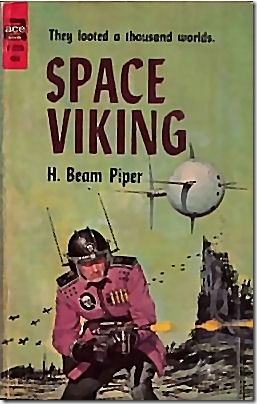 Space Vikings was serialized in Analog in 1962-63. Piper committed suicide not long afterwards. Piper, as far as I can tell, was not considered to be more than a hack writer in his own time, but has recently risen to the ranks of a truly unique and respected writer from the golden age. He wrote stories an novels from 1947 to 1963.
Space Vikings was serialized in Analog in 1962-63. Piper committed suicide not long afterwards. Piper, as far as I can tell, was not considered to be more than a hack writer in his own time, but has recently risen to the ranks of a truly unique and respected writer from the golden age. He wrote stories an novels from 1947 to 1963.
Piper wrote a series of future history novels, which could be classified as military SF. Space Vikings is one of these. It reads like an historical novel and is probably similar to the mainstream historical novels of the time. Although it is Science Fiction, there is nothing in the story that would prevent it from being set as a real Viking novel or even reset in any time or place. The plot is a good one where a man is nearly killed and his wife murdered by a madman who is insanely jealous. The man joins with free-booting space Vikings, a loosely organized group of planets that survive by trade as well as raiding weaker systems.
The story is the rise of the Space Viking from an educated nobleman to a ruthless Leader of men and his search for the man who killed his true love. Along the way there is plenty of politics, action and a love affair with a beautiful princess.
Piper’s writing is energetic and clear. He is easy to read and understand and yet his plots are full of unexpected twists and turns with rich characterizations. The story is a swashbuckler with lots of blood running down the scuppers. I enjoyed it much more than the endless and plodding Honor Harrington Books, even though they have much in common.
More interesting is Beam’s philosophy, which he includes from time to time. Beam was a gun enthusiast (he killed himself with one of his own weapons), and he would be characterized as a conservative today. He might have belonged to the John Birch society, as far as I can tell from his writings, but it is never obnoxious, strident or even illogical.
Here is an example from the book (page 151):
Every society rests on a barbarian base. The people who don’t understand civilization and wouldn’t understand if they did. The hitchhikers. The people who create nothing, and who don’t appreciate what others have created for them, and who think civilization is a something that just exists and that all they need to do is enjoy what the can understand of it – luxuries, a high standard of living, and easy work for high pay. Responsibilities? Phooey! What do they have a government for?
In spite of the run-on sentence, you have to tend to agree with Piper on this. Piper has some valid points. It is a central theme of the book that Piper doesn’t much like Democracy. He says that it is full of bugs and we need to spend more time getting the bugs out before we put our faith in it. He points out that Hitler rose to power by using a democracy, but got rid of it as soon as possible.